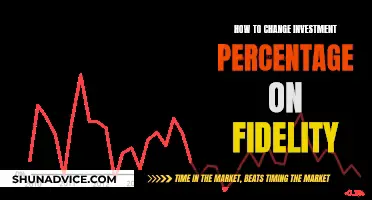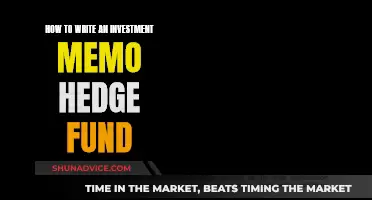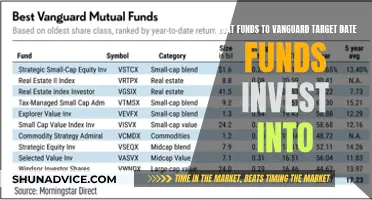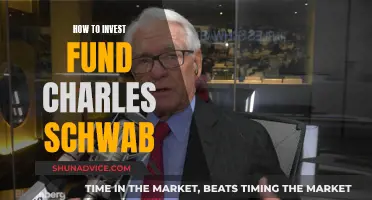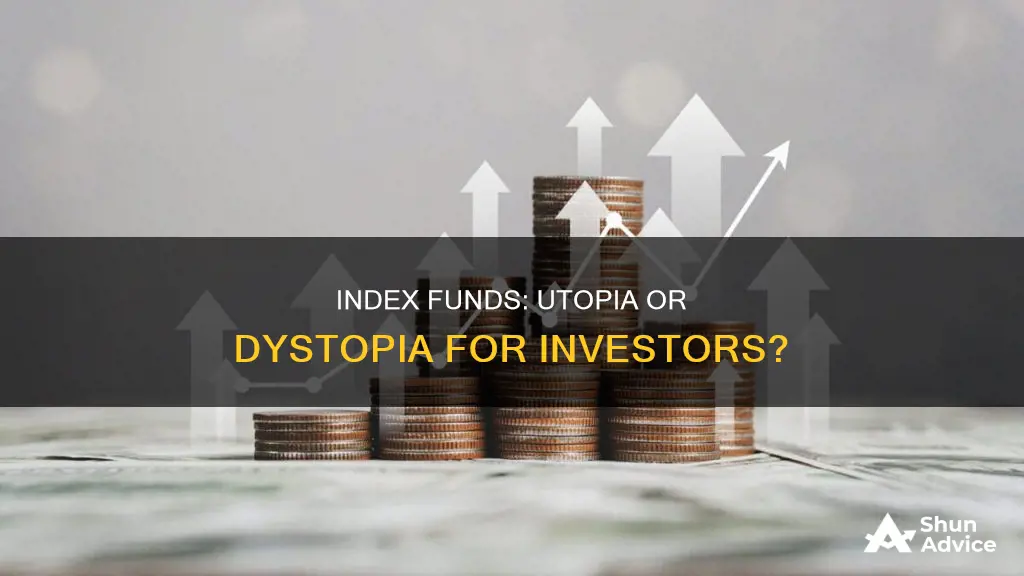
Index funds are a popular investment strategy, but what would happen if everyone invested in them? Some experts argue that the market would break, as active traders are essential for price discovery and market capitalization. Without them, it would be impossible to value stocks. However, others claim that this scenario is unlikely, as there will always be investors looking to beat the market. While index funds have gained popularity, they only own a small percentage of the stock market, so the chances of them causing problems are slim.
| Characteristics | Values |
|---|---|
| Market Capitalization | Market capitalization would cease as there would be no active traders to decide the value of stocks. |
| Total Market Value | Total investor portfolios would not equal the total market value. |
| Active Managers | Active managers would fall behind the market and may leave the industry, leading to a lack of competition and reduced market efficiency. |
| Stock Prices | Stock prices would not reflect the fair value of companies but rather the inflow of funds to indexes. |
| Price Discovery | Index funds do not engage in price discovery, which is essential for the market. |
| Fees | Active management is more expensive than passive investing, leading to lower returns for active managers. |
| Corporate Governance | Passive investors may not take stances on corporate governance issues, leading to potential mismanagement and self-enrichment by company management. |
What You'll Learn

Market breakdown
The stock market would break if everyone invested in index funds. This is because the market capitalization of stocks would cease to exist. Market capitalization is when active traders decide which stocks are the most valuable and which show little promise. Without active traders, the valuation of stocks is virtually impossible.
Index funds do not participate in the price discovery process in the same way as the traditional practice of buying and selling individual stocks. They are pools of money that buy groups of stocks in certain proportions at the current stock market price. They do not take a view on what the price of a stock should be.
If everyone invested in index funds, the market of buyers and sellers would no longer set the fair market price of stocks. In this sense, the stock market would no longer be a "market".
Additionally, active managers will always fall behind the market on average. This is because the total portfolios of all investors and managers must equal the market's entire value. Active managers pay trading costs and other fees that lessen the return, while passive managers do not.
If everyone invested in index funds, there would also be less competition among companies. This is because index fund managers would feel little incentive to put pressure on a company for value maximization.
Furthermore, investors, even passive ones, would fly blind when it came to the true value of a security, and mispricing would boom. This would result in capital not flowing into promising investments. Instead, capital would head towards bad investments on an equal level with good investments.
S&P Mutual Funds: A Smart Investment Strategy
You may want to see also

No market capitalization
If everyone invested in index funds, the market capitalization would cease to exist. Market capitalization is the process by which active traders decide which stocks are the most valuable and which show little promise. Without active traders, there would be no one to determine the value of stocks, as index funds do not engage in price discovery.
Price discovery is an essential aspect of the market, and while index funds reflect the total market by owning every stock, they do so in the percentage of each fund's market cap. In other words, the stocks are valued based on the fund's market cap, not on their individual performance.
If everyone invested in index funds, the market would be made up entirely of passive investors. Passive investors do not decide which stocks to buy and sell based on their individual performance, but rather, they hold every security in that particular index. This means that even if a stock becomes overvalued, it will still carry more weight in the index. This is the opposite of what an astute investor would want to do, as they would want to lower their portfolio's exposure to that stock.
Additionally, with everyone investing in index funds, there would be no incentive for companies to compete with each other. This is because index fund managers are not trying to tell companies how to run their businesses or change their strategic focus. Instead, they are looking at how boards are structured, risk management policies, and overall governance and executive experience.
In conclusion, if everyone invested in index funds, the market capitalization would cease to exist, as there would be no active traders deciding the value of stocks. This would lead to a situation where stocks are valued based on the fund's market cap, rather than their individual performance, and companies would have less incentive to compete with each other.
Best S&P Index Funds: Top Picks for Your Portfolio
You may want to see also

Active managers fall behind
If everyone invested in index funds, active managers would fall behind. This is because active managers incur trading costs and other fees that bring down their returns, while passive managers do not. Active managers also conduct a lot of trades, but very few of them beat the market.
Mathematically, active managers will always fall behind the market on average. This is because the total portfolios of all investors and managers must equal the market's entire value. If there were no index funds, the entire market would be actively managed. However, index funds reflecting the total market own every stock, so the actively managed portion must collectively equal the market as well.
If everyone invested in index funds, the market would no longer be a "market". Active traders are the people who decide which stocks are the most valuable and which show little promise. They are busy every business day trying to beat the market, and without them, valuing stocks would be almost impossible.
Additionally, if everyone indexed, there would be less competition among companies. Company managers are already under pressure to maximise shareholder value. They receive part of their compensation in company stock, so their bonuses, salaries, and jobs depend on shareholder returns.
In summary, if everyone invested in index funds, active managers would fall behind due to the costs and fees associated with active management, the low number of active managers who beat the market, and the mathematical impossibility of active managers keeping up with the market. The market would also lose its efficiency as there would be no active traders setting stock prices, and there would be less competition among companies.
Best Vanguard Funds for Your Taxable Investment Portfolio
You may want to see also

Mispricing will boom
If everyone invested in index funds, the market would be flooded with mediocre passive managers. This would result in a lack of fundamental analysis on each security, causing investors to fly blind when it came to the true value of a security. In other words, mispricing would boom.
Index fund investors would own shares of stock that are wildly overvalued or undervalued. Adequate valuation of securities would become almost impossible. This would lead to a lethargic market, with capital flowing into bad investments and away from promising investments.
The disappearance of active traders would mean that there would be no one deciding which stocks are the most valuable and which show little promise. This would remove the process of price discovery, which is an essential aspect of the market.
Currently, around 20% of all stocks are owned by index funds, leaving 80% actively traded. This means that there are still plenty of active traders busy trying to beat the market and discover the true value of stocks. However, if everyone were to switch to index funds, there would be no one left to perform this crucial function.
In conclusion, a mass move to index funds would result in a market flooded with mispriced stocks, with investors unable to distinguish between promising and poor investments.
IRA Investment Options: Mutual Funds or ETFs?
You may want to see also

Lack of corporate governance
Index funds are investment funds that track the performance of a particular index, such as the S&P 500. They have become increasingly popular among investors in recent years. However, if everyone invested in index funds, it could lead to a lack of corporate governance, as outlined below.
Underinvestment in Stewardship
Index fund managers have limited incentives to invest in stewardship, or the monitoring and engagement with portfolio companies, as they are remunerated with a small percentage of their assets under management. Any increase in the value of a portfolio company would result in a small fraction of gains for the fund manager. Additionally, rival index funds tracking the same index would benefit from the increased value without incurring any costs.
Excessive Deference to Corporate Managers
Index fund managers have incentives to be excessively deferential to the preferences and positions of corporate managers. This is because the decisions made by index fund managers can affect not only the value of the fund's portfolio but also their private interests. Existing or potential business relationships between index fund managers and portfolio companies can influence the adoption of principles, policies, and practices that favour corporate managers.
Impact on Governance Reforms and Securities Litigation
Index fund managers may choose to stay on the sidelines regarding corporate governance reforms and avoid involvement in consequential securities litigation. They may refrain from submitting shareholder proposals or taking lead plaintiff positions in securities class actions, even when their investors have significant stakes in the companies involved.
Limited Personnel and Communications
Index fund managers, particularly the "Big Three" (BlackRock, State Street Global Advisors, and Vanguard), devote limited personnel time and resources to stewardship for most of their portfolio companies. They have private communications with only a small minority of portfolio companies, and their focus is primarily on governance principles rather than financial performance or director characteristics.
Voting Patterns
Index fund managers often exhibit pro-management voting patterns, rarely opposing corporate managers in say-on-pay votes or proxy contests with activist hedge funds. This further reinforces the potential lack of corporate governance if everyone invested in index funds.
Vanguard Mutual Funds: Best Retirement Investment Options
You may want to see also
Frequently asked questions
If everyone invested in index funds, the market would break. Index funds don't participate in the price discovery process, so the fair market price of stocks would no longer be set by the market of buyers and sellers.
The price discovery process is how the market determines stock prices. Buyers and sellers place bids for stocks at certain prices, and the current stock price moves up and down based on the price at which people are willing to buy and sell.
If everyone invested in index funds, the prices of stocks would simply reflect the inflow of funds to indexes, rather than the fair value of the companies in the stock market.


